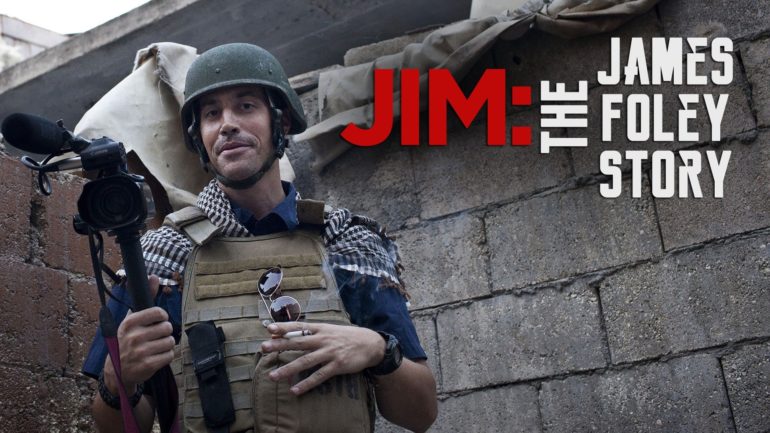James Wright Foley was born in a small city just north of Chicago in 1973. He was the oldest of five children from a middle class, catholic family and after university he went on to become a teacher before making a switch to journalism. He had an insatiable sense of adventure and this restlessness at home lead to him becoming a freelance war correspondent in places like Iraq, Afghanistan, Libya and Syria. He was passionate about his work and about helping those caught up in the carnage of war. On August 19th, 2014, James Wright “Jim” Foley became the first high profile prisoner to be executed by a then largely unknown militant group called ISIS.
Jim: The James Foley Story is a powerful documentary exploring the life and work of this extraordinary individual, and the aftermath of his public execution at the hands of one of the most feared terrorist factions the world has ever seen. Pieced together through interviews with his family and friends, as well as a group of journalists who spent time with Jim in captivity it is a wholly engaging character study of a man torn between trying to do right by his loved ones while trying to stay true to himself and his own ideology.
Director Brian Oakes manages to elicit some genuine raw emotion from a family still deeply wounded by the loss of a loved one and there is depth to the emotion rarely seen in interviews like this. Running through the river of hurt and pain that they are feeling there is also anger, frustration and incomprehension, not only as to why a government sat idly by and let something like this happen, but why Jim put himself in harms way time and again, having already experienced the horrors of captivity at an earlier stage in his career.
In fact one of the few areas where the documentary falls short is in the machinations of what was going on in the background during Jim’s time in captivity. You’re left with the feeling that Oakes only begins to scratch the surface of the political decisions that impacted James Foley and the many other hostages that ultimately lead to the decisions to release some and sacrifice others.
Testimonial from Jim’s colleagues and fellow detainees like Daniel Rye, Javier Manzano, Alice Martins and Simon Klingert paint Jim as something of a stoic, intelligent man whose actions were selfless and driven by a desire to see good in the world. The interviews with a select few hostages who experienced the brutality of ISIS alongside Jim is especially touching and poignant; an epitaph to a man they saw as a leader amongst them in their hardship, and more importantly to a friend whose absence is still felt.
Jim: The James Foley Story doesn’t seek to be anything more than a tribute to a man whose legacy is an extraordinary body of work on the front-lines of some of the most dangerous conflicts on earth. James Foley spent his life doing what he believed was right and was necessary. This film is as much a celebration of his life as it is a narrative about his untimely death and the way it has shaped the world in the short time since.

